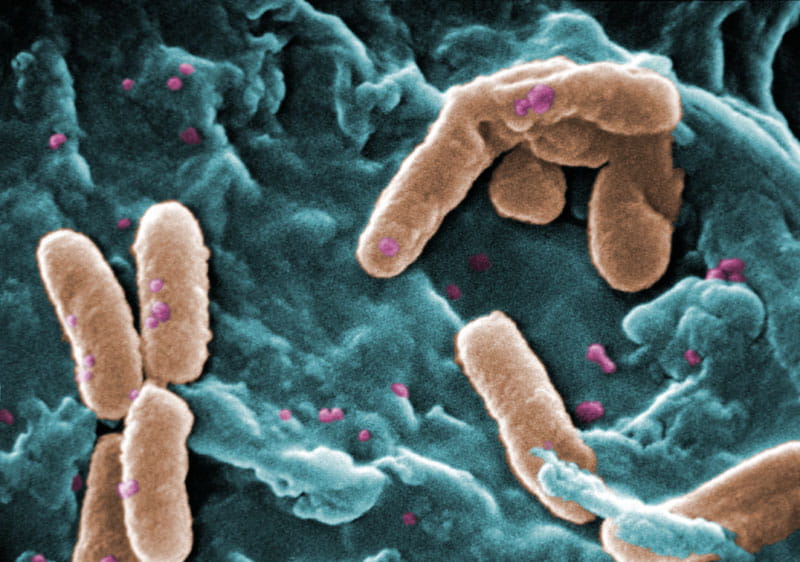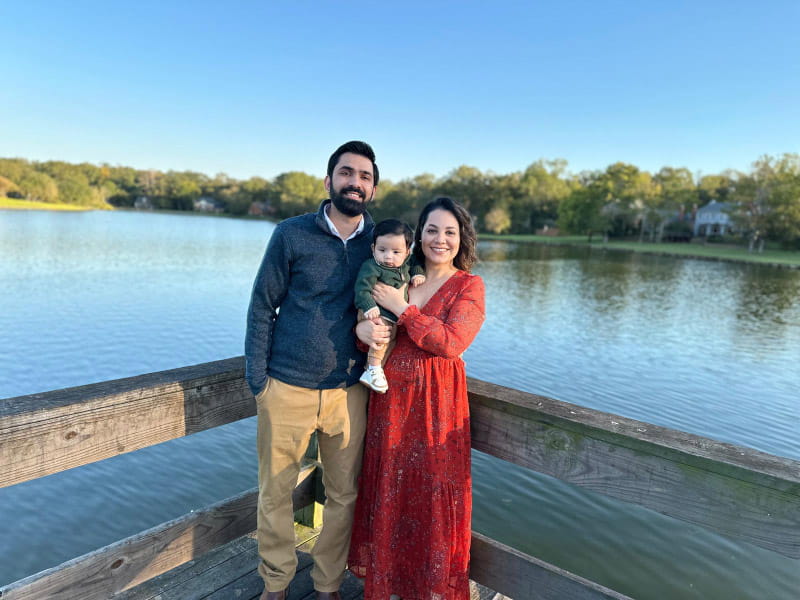Stopping colds, flu and infectious diseases is her job – as a scientist and a new mom
By Michael Merschel, American Heart Association News

Dr. Zerelda Esquer Garrigos was in medical school when she became fascinated by a 1926 book about the discovery of microbes.
"I was captivated by the idea that there are countless 'worlds' within our own – microorganisms that coexist with us, often without our awareness, yet some can cause disease," she said about Paul de Kruif's scientific classic. Esquer Garrigos knew she wanted to learn more about them and how they affect human health.
Today, she's an assistant professor of infectious diseases at the University of Mississippi Medical Center School of Medicine in Jackson, where she and her husband, Dr. Prakhar Vijayvargiya, co-direct the hospital's Transplant Infectious Diseases Program. They're parents to a newborn son, Rohan, who arrived in June.
Esquer Garrigos' professional focus is on managing infections in immunocompromised patients, including those who have had organ and bone marrow transplants. "My primary interest is treating patients with heart transplants and cardiovascular devices, as they are particularly susceptible to complex, infection-related complications," she said.
But having a baby in the house means she's paying extra attention to the risks of colds, flu and other virus-caused respiratory illnesses, which tend to be more common during colder months as people stay indoors and are in closer proximity to others.
So we asked Esquer Garrigos how she protects herself for "The Experts Say," an American Heart Association News series where specialists explain how they apply what they've learned to their own lives. Her remarks have been edited.
What are the most important things someone can do to keep from getting sick this time of year?
One of the most effective ways to prevent illness during cold and flu season is by practicing good hand hygiene. Regularly washing your hands with soap and water, especially after touching shared surfaces, is crucial for reducing the spread of viruses.
It's also important to avoid large crowds, particularly in enclosed spaces where germs can circulate more easily.
Being mindful of your sick contacts is also key. Try to limit close contact with people who are showing symptoms of illness.
Finally, staying up to date on vaccinations, such as the flu shot, adds another critical layer of protection during this time of year.
Which vaccinations should people be updating, and why are they important?
The annual flu shot is crucial, as it helps protect against the most common strains of the flu virus, reducing both the risk of illness and the severity if you do get sick. The COVID-19 vaccine also is important, particularly with new variants emerging. Staying up to date on your COVID vaccinations helps safeguard against severe illness and protect those around you.
Additionally, the RSV vaccine (for a common respiratory virus) can be an important preventive measure, especially for older adults and individuals with underlying health conditions.
These vaccines work together to provide a strong defense during this time of year when viral infections are more common.
Many of us learned about the value of hand-washing during the pandemic. Do you recommend any particular type of soap? Or should any be avoided?
Can you believe that, historically, even doctors didn't always recognize the importance of hand-washing? It wasn't until Dr. Ignaz Semmelweis emphasized the link between hand hygiene and infection prevention in the 19th century that the medical community began to understand. But even then, it took years for the practice to be widely accepted. Thankfully, today we know just how vital this simple practice is.
Regular hand-washing is one of the simplest yet most effective ways to prevent the spread of infections. Any plain soap – whether liquid or bar – works well, as long as you're washing your hands thoroughly for at least 20 seconds and covering all surfaces.
Antibacterial soaps aren't necessary for everyday use and can even contribute to antibiotic resistance, so sticking to regular soap is sufficient. It's also important to avoid harsh soaps that can dry out your skin, as healthy skin is an essential barrier to infection.
Do you find any particular microbe more interesting than others?
I am particularly fascinated by Pseudomonas aeruginosa. This bacterium possesses an incredibly sophisticated mechanism for establishing infections and evading both the immune system and antibiotic treatment.
What intrigues me the most is how we can observe "evolution" in real time, as Pseudomonas has the ability to develop resistance during antibiotic therapy. This phenomenon serves as a striking example of natural selection and the selective pressures acting on bacterial populations. It vividly illustrates the dynamics of evolutionary change.

The early days of COVID-19 were the first time many of us became fully aware of how many viruses, bacteria and fungi are out there in the world. Is it ever overwhelming to think of all the germs everywhere?
Rather than feeling overwhelmed, I've always been driven by a desire to learn more about current and emerging organisms. My curiosity about the microbial world has only deepened over time.
However, I will admit that my perspective shifted when my firstborn arrived. The responsibility of protecting a newborn from infections added a layer of awareness and concern that I hadn't experienced before.
How has that affected the measures you take?
With an infant at home, we're being especially cautious this season.
I wear a mask in clinical settings and crowded places to minimize exposure to airborne pathogens. I wash my hands frequently and use hand sanitizer when necessary. Additionally, I avoid large gatherings, particularly indoors, and ensure that anyone visiting my home is symptom-free.
I also pay close attention to any symptoms I may develop and take appropriate measures to stay isolated if needed.
How else has your knowledge of microorganisms affected your daily life?
In my work environment, I am fortunate to be part of a collaborative team that includes transplant surgeons, pharmacists and hospitalists. I love using my expertise to serve patients and enhance their quality of life.
Discussing cases at dinner with my husband adds an extra layer of fun to our conversations, blending our professional insights with our personal lives.
Also, I always protect myself from mosquito bites, which can transmit diseases. And I avoid eating anything raw.
You just returned to work after maternity leave. How are things going?
Having Rohan has brought immense joy to our lives. I love being a doctor and a researcher, but being a mom is truly the best job I've ever had. While the demands of motherhood can be tiring, Rohan gives me a special energy that drives me to continue improving our community through patient care.
I'm also excited to introduce him to the microscopic world. I'm sure he'll share my enthusiasm for the fascinating realm of microorganisms!






